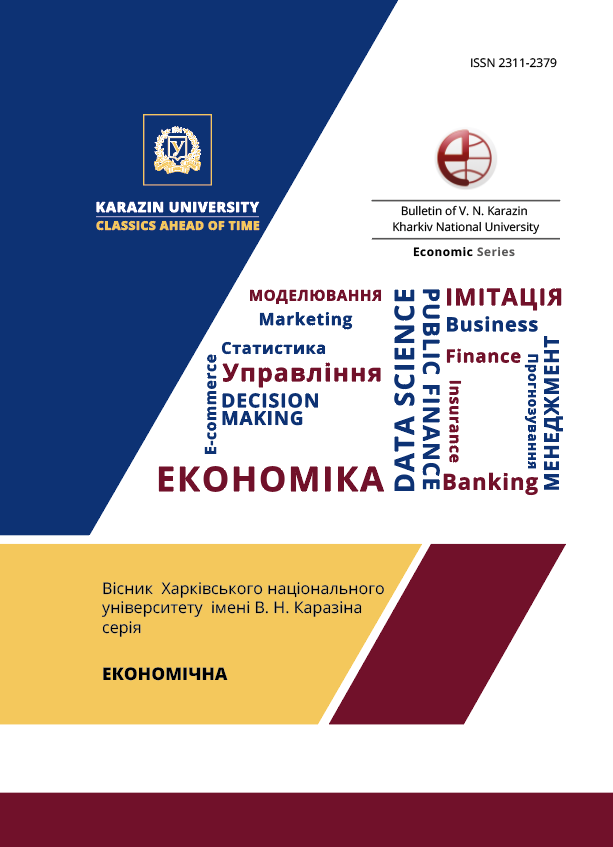Transformation of the social-economic and political values in Ukraine to the European Union values
Abstract
The article aims to analyze basic value approaches and define the main and decisive factors of values transformation. The research methods include descriptive analysis, institutional approach, and economic and statistical methods. The hypothesis of the study is to study how public perceptions have changed in extreme conditions (military conflict) towards European integration values. The broad scope of economic and sociological works reveals the necessity of a special analysis of the European integration and regional values adaptation in Ukraine and defines the problem for study, use, and dissemination of knowledge of the European Union values. The analysis of various value theories identifies the urgency and necessity of human behavior from the human value estimation study. We estimate how economic development depends on economic, political, and social values transformation and the overall indicators (market and democracy) reforms in Ukraine. We apply data from surveys to the comparing the population’s attitude toward European values since Ukrainian independence. The designation of core values allows formulating a strategy and intensifying a more sustainable strategy of political and social-economic development.
Downloads
References
Alston, L, J., Eggertsson, T., North, D.C. (1996). Empirical Studies in Institutional Change. Lee J. Alston, Thrainn Eggertsson, Douglass C. North (Eds.). Cambridge University Press.
Amable, B. (2003). The Diversity of Modern Capitalism. Oxford University Press.
Aziz, N., Chowdhury, M., Cooray, A. (2022). Why do People from Wealthy Countries Migrate? European Journal of Political Economy. Vol. 73.
Cato, M.S. (2006). Market, Schmarket. Building the Post-Capitalist Economy. New Clarion Press.
Chase Dunn, Grell Brisk, M. (2019). World System Theory. 26 November. Retrieved from https://www.oxfordbibliographies.com/view/document/obo-9780199743292/obo-9780199743292-0272.xml#obo-9780199743292-0272-div1-0002.
Doing Business 2020. (2020). International Bank for Reconstruction and Development. The World Bank.
Dweck, C.S., Ehrlinger, J. (2006). Implicit Theories and Conflict Resolution. in M. Deutsch, P. Coleman, & E. Marcus (Eds.). The Handbook of Conflict Resolution, 2. San Francisco: Jossey-Bass.
Fisher S, Abdi D, Ludin, J., Smith, R., Williams, S. (2000). Working with Conflict: Skills and Strategies for Action. London: Zed.
Foster, J.F. (2020). Value Theory and Economic Progress: The Institutional Economics. Springer. Dordrecht. doi: https://doi.org/10.1007/978-94-011-3998-4.
Hall, P.A. & Soskice, D. (2001) Varieties of Capitalism. The Institutional Foundations of Comparative Advantage. Peter A. Hall & David Soskise (Eds.). Oxford University Press Inc., New York.
How Ukrainians Perceive European Values. Main Results of an Empirical Survey. (2017). Ed. Mattes Buhbe.
Korostelina, K.V. (2013). Identity and power in Ukraine. Journal of Eurasian Studies, 4, 34-46.
Lebson, M. (2013). Why refugees rebel: Towards a comprehensive theory of refugee militarization. International Migration, 51(5), 133-148.
Lukes, S. (2005). Power and the Battle for Hearts and Minds. Millennium, 33(3), 477-493.
Luijkx, R., Reeskens, T., Sieben, I. (Edts.).(2022). Reflection on European Values: Honouring Loek Halman’s Contribution to the European Values Study”. Tilburg. Open Press TiU.
Morris, I. (2014). War! What Is It Good For? Conflict and the Progress of Civilization from Primates to Robots. Macmillan.
Mumtaz Ahmad, S. (2021). Theories of International Relations: Role of Values and Power. IUP Journal of International Relations; Hyderabad, Bd.15. Ausg.2:7-19. Retrieved from https://www.proquest.com/scholarly-journals/theories-international-relations-role-values/docview/2554403933/se-2?accountid=10776
Nafus, I. (2018). System of Values as a Basis for Social Capital Formation. XXI. № 1. Retrieved from http://www.intellect21.nuft.org.ua/index.php/en/issue-1-2018.
Nosova, O. (2020). Transformation Shifts in Economy: Basic Approaches. Eurasian Journal of Higher Education,1(1). doi: https://doi.org/10.31039/ejohe.202.1.25.
Nosova, O. (2022). Transformational Change: Challenges and Development Prospects. The Case of Ukraine.” Social Entrepreneurship Review, 1. URL: https://ser.uek.krakow.pl/index.php/ser/article/view/79/73.
Nosova, O., Lypov, V. (2022). Cultural Values in the Formation of Economic Relations. London Journal of Social Sciences, 2(4). doi: https://doi.org/10.31039/ljss.2022.4.86.
Pereira, P., Zhao, W., Symochko, L., Inacio, M., Bogunovic, I., Barcelo, D. (2022). The Russian-Ukrainian Armed Conflict Impact Will Push Back the Sustainable Development Goals. Geography and Sustainability. doi: http://doi.org/10.10.1016/j.geosus.2022.09.003.
Ponizovskiy, V., Ardag, M., Grigoryan, L., Boyd, R., Dobewall, H. (2020). Development and Validation of the Personal Values Dictionary: A Theory Driven Tool for Investigating References to Basic Human Values in Text. European Journal of Personality, 34, 885-902.
Reeskens, T. (2022). Are Ukrainian values closer to Russia or to Europe? Retrieved from https://blogs.lse.ac.uk/europpblog/2022/03/04/are-ukrainian-values-closer-to-russia-or-to-europe/.
Sheth, J. (1991). Why We Buy What We Buy: A Theory of Consumption Values. March. Retrieved from https://www.jagsheth.com/consumer-behavior/why-we-buy-what-we-buy-a-theory-of-consumption-values/.
Shkalina, G. (2020). European Values: the History of Formation. Vestnik of the Mari State University. Chapter “History. Law”, 6(1), 69-79. (in Russian)
Tilly, C. (1985). War Making and State Making as Organized Crime. Chap 5 in Bringing the State Back In, edited by Peter B. Evans, Dietrich Rueschemeyer, and Theda Skocpol. Cambridge University Press.
Ukraine in World Values Survey. Resume of the Analytical Report. (2020). NGO Ukrainian Centre for European Policy. Kyiv.
Weatherill, S. (1995). Law and Values in the European Union. Clarendon Law Series.
World Values Survey. Wave 6. (2010-2014). 2020. Retrieved from https://www.eui.eu/Research/Library/ResearchGuides/Economics/Statistics/DataPortal/WVS.

